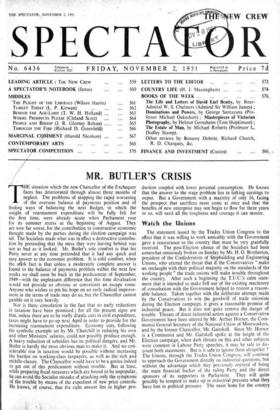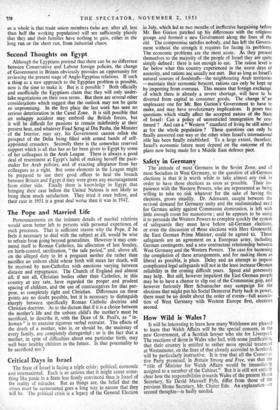Watch the Unions
The statement issued by the Trades Union Congress to the effect that it was willing to work amicably with the Government gave a reassurance to the country that must be very gratefully received. The post-Election silence of the Socialists had been somewhat ominously broken on Sunday by Mr. H. G. Brotherton, president of the Confederation of Shipbuilding and Engineering Unions, who uttered the threat that if the Conservatives " make an onslaught with their political majority on the standards of the working people " the trade unions will make trouble throughout the country. After such a beginning the T.U.C.'s calm state- ment that it intended to make full use of the existing machinery of consultation with the Government helped to restore a reason- able balance. Taken together with the deliberate attempt made by the Conservatives to win the goodwill of trade unionists during the Election campaign, it gives a reasonable promise of industrial peace. But it does not quite remove the danger of trouble. Threats of direct industrial action against a Conservative Government have been uttered by Mr. Arthur Horner, the Com- munist General SeCretary of the National Union of Mineworkers, and by the former Chancellor, Mr. Gaitskell. Since Mr. Homer is a Communist and Mr. Gaitskell spoke at the height of the Election campaign, when dark threats on this and other subjects were common in Labour Party speeches, it may be safe to dis- count both statements. But is it safe to ignore them altogether ? The Unions, through the Trades. Union Congress, will continue to approach the Government directly on industrial questions, but without the advantage which they previously enjoyed of being the main financial backer of the ruling Party and the direct sponsors of its supporters in Parliament. They will quite p�oosssibly be tempted to make up in industrial pressure what they have lost in political pressure. The main hope for the country as a whole is that trade union members (who are, after all, less than half the working population) will see sufficiently plainly that they and their families have nothing to gain, either in the long run or the short run, from industrial chaos.



































